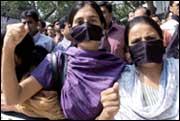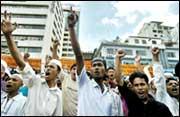Increasing infiltration across the border. Terrorists sneaking into India. Regular skirmishes with men in uniform on the other side.
This is not Pakistan we are talking about. In recent times, another neighbour has swiftly emerged as a major security concern for India.
Rediff India Abroad Deputy Managing Editor Ramananda Sengupta visited Bangladesh recently looking for answers to the big question: Why is such trouble brewing on India's Eastern Front?
Part 1: Next terror frontier?
At the food court on the sixth floor of the gleaming Bashundhara City Mall in downtown Dhaka, a group of young students linger over their coffee.
The three young girls eye five lads who strut and swagger, and the flirting is punctuated by occasional hoots of raucous laughter as a joke or jibe sinks in.
Three tables away, a middle-aged maulvi (Islamic cleric) is not amused.
Image: Bangladeshi students protest against nationwide bombings "Look at these prostitutes," he mutters to the burqa-clad woman accompanying him. "If our daughters had done this, I would have whipped them within an inch of their lives."
"Look at these prostitutes," he mutters to the burqa-clad woman accompanying him. "If our daughters had done this, I would have whipped them within an inch of their lives."
The incident illustrates the damning dichotomy which prevails in Bangladesh today.
The students represent the educated liberals, who continue to flirt and play, refusing to acknowledge the mullahs glowering over their shoulders.
Of late, encouraged, and some say endorsed, by an impotent government, the mullahs' mutterings have been replaced with bombs.
The bombings and growing intolerance are part of a concerted attempt to replace the parliamentary system of governance in Bangladesh with Islamic law, or the Sharia.
Almost everyone accepts that Prime Minister Khaleda Zia of the ruling Bangladesh Nationalist Party is hamstrung by the fact that her four-party alliance includes hardliners who endorse such a demand.
The recent spate of bombings, including the nationwide serial blasts on August 17, 2005 and the recent attacks on judges and government officials, are mostly attributed to the Jamaatul Mujahideen Bangladesh.
Its operations commander Banglabhai alias Azizur Rahman alias Siddiqur Islam -- who reportedly got his name while fighting alongside the Taliban in Afghanistan -- originally started his operations in some districts near the Indian border, by enforcing a strict adherence of Sharia in the region where his cadres, said to number around 10,000, held sway.
He is said to have links with several ruling MPs and the Jaamat leadership. Now underground, his cadres teamed up with the Ahle Hadith Andolon Bangladesh 'to bring about an Islamic revolution in country.'
The radical outfit, which was ostensibly banned in February following threats of withdrawal of aid by the European Union and other Western nations, wants the immediate imposition of 'Koranic laws' in the nation.
So do dozens of smaller but equally vociferous outfits, many bankrolled by Saudi Arabia and Pakistan. And their objectives are not limited to Bangladesh.
The government, however, continues to stoutly deny the country has become a breeding ground for not just domestic, but international terrorist outfits, many with links to Osama bin Laden's Al Qaeda.
But with judges threatening an indefinite stir from January unless they are guaranteed protection from the extremists and increasing international concern over the situation in Bangladesh, this position is becoming increasingly untenable, and conflicting signals are starting to emerge.
This was exemplified with the BBC's Bengali service quoting BNP Senior Joint Secretary General Tarique Rehman as saying that international terrorist outfits like Al Qaeda 'might be' involved in the August 17 serial blasts.
Rehman, the eldest son of Prime Minister Zia and the late President Zia-ur Rahman, received the first South Asian Association for Regional Cooperation award during the group's summit in Dhaka November 12 to November 13 on his father's behalf.
After the BBC broadcast, a startled BNP forced Rehman to demand that the BBC clarify that he had not claimed that Al Qaeda was active in Bangladesh.
"They (the BBC producers) admitted making the mistake. I neither admitted nor denied anything when they (the BBC) asked me a question mentioning a name of an organisation," clarified Rehman. "I did not mention any name. I said 'it might be.'"
Fundamentalism is not new to Bangladesh.
When it broke away from Pakistan to forge its own destiny in 1971, the nation was perceived as a moderate Muslim democracy based more on its linguistic and cultural, rather than religious, moorings.
Sheikh Mujibur Rahman, the nation's founding father, declared that the People's Republic of Bangladesh would be a secular and socialist State, and embarked on a nationalisation spree.
But like its parent, Pakistan, Bangladesh struggled to handle its newfound democracy.
In 1974, faced with major economic and political crises, Mujib declared a state of emergency and amended the constitution to established a one-party system, led by the President: himself.
A year later, on August 15, 1975, Mujib and virtually his entire family were gunned down by army officers. His former colleague Khondakar Moshtaque assumed power, only to resign months later following two coup attempts which finally brought General Zia-ur Rehman to power. Backed by Zia, Bangladesh Supreme Court Chief Justice Abu Sadat Muhammad Sayem became President and chief martial law administrator on November 7, 1975.
At that time, there were reports the nation would be renamed the Islamic Republic of Bangladesh, but that did not happen.
Zia, who became chief martial law administrator in November 1976 and President in April 1977 after Sayem quit on grounds of ill health, started wooing the fundamentalists in order to retain his support base. 'We give religion due importance in our life. Our people are very religious. I do not think any Muslim country has such a large number of mosques,' he declared.
In February 1979, his Bangladesh Nationalist Party won 60 per cent of the votes in the parliamentary election. Two years later, in May 1981, Zia was assassinated, and Vice-President Abdus Sattar assumed the presidency in November.
Barely a year later, in March 1982, Lieutenant General Hussain Mohammad Ershad overthrew Sattar, and assumed full powers as chief martial law administrator.
Like Zia, Ershad wooed the fundamentalists to retain his grip on power, and allowed parties like the Jaamat e Islami -- banned by Mujib in the 1970s because of its opposition to independence from Pakistan -- and other fundamentalist parties to return to mainstream politics.
The Jamaat, which advocates a theocracy in Bangladesh and draws much of its cadres from the mushrooming madrassas in the country, is now a part of the ruling coalition led by Zia's widow Khaleda Rehman.
In a recent series of hard-hitting exposes titled 'Inside the Militant Groups', Dhaka's Daily Star newspaper profiled the main extremists and militant organisations said to be active across Bangladesh.
All of them want Islamic or Sharia law imposed in Bangladesh, and draw their cadres from the madrassas mushrooming  across the nation. Most of them are funded by Pakistan and Saudi Arabia, and like in Pakistan, they quickly change their names whenever the government does decide to crack down on them. The JMB, for instance, has changed its name 18 times already.
across the nation. Most of them are funded by Pakistan and Saudi Arabia, and like in Pakistan, they quickly change their names whenever the government does decide to crack down on them. The JMB, for instance, has changed its name 18 times already.
Many have joined hands with the Tablig Jamaat, an ostensibly non-violent and non-political religious movement.
The main outfits operating in the country at the moment include the Jama'atul Mujahideen Bangladesh and Jagrata Muslim Janata Bangladesh, both led by Shaikh Abdur Rahman.
The top leadership of these outfits were reportedly trained in Afghanistan and Pakistan, and originally belonged to the Islami Chhatra Shibir, the student front of the Jamaat-e-Islami Bangladesh, a coalition partner in the government.
Some reports, however, say the JMJB is the youth front for the Harkat-ul-Jehad-al-Islami, or HUJI.
The JMJB is said to be behind the recent nationwide blasts and the attacks on judges. Launched in 1998, it wants to capture power 'through armed revolution and establish Islamic rule by a Majlish-e-Shura.' It also wants to rid the nation of 'anti-Islam forces' which allow women 'out of their houses'.
Though the group was officially banned in February, the top rung of the outfit -- responsible for a string of attacks across the nation -- remains at large.
'Our model involves many leaders and scholars of Islam. But we will take as much ideology from the Taliban as we need,' Shaikh Abdur Rahman is quoted as saying. The JMJB will 'build a society based on the Islamic model laid out in the Holy Koran and Hadith.'
The operations commander of the JMJB is 'Siddiqul Islam alias Bangla Bhai alias Azizur Rahman alias Omar Ali Litu,' who claims 'the outfit has 300,000 activists and about 10,000 full-time activists across the country and spends up to Taka 700,000 (roughly Rs 488,201) on them a month,' says the Star report.
Other outfits include:
HUJI: Launched with Osama bin Laden's assistance in 1992. Mainly active in the southeastern coastal belt stretching from Chittagong through Cox's Bazar to the Myanmar border, 'its cadres allegedly infiltrate frequently into the bordering eastern region of India to maintain contacts with terrorist outfits of the region.'
Shahadat Al Hiqma: Linked with the Lashkar-e-Tayiba and Nepal-based Maoist organisations, this group believes 'firearms are the only way to eradicate injustice.' Its leader, Shamim Uddin, who is in police custody, says fugitive Indian gangster Dawood Ibrahim was among those who provided him with funds. Banned in February 2003, but sections of top leadership still at large.
Hizbut Towhid: Founded by Mohammad Bayezid Khan Ponni alias Selim Ponni in 1994, the outfit does not believe in the democratic system of government, and is known to promote strict adherence to Sharia laws in places where it is active.
Hizb-Ut Tahrir: Originally founded in 1953 by Tokiuddin Al Nakhani in Jerusalem five years after Israel captured Palestine, the extremist outfit's Bangladesh branch was set by Golam Mowla, Nasimul Gani and Kawsar Shahnewaj in 2000. The outfit believes a true Islamic State can only be achieved when Muslims worldwide unite, and aims to do this through various seminars and lectures which openly promote radical Islam at various university and school campuses across the nation.
Islami Biplobi Parishad: Led by former Jaamat e Islami leader Moulana Abdul Jabbar, who launched the new outfit in June 2001. Soon afterwards, Jabbar wrote to newly elected Prime Minister Khaleda Zia demanding that she declare Bangladesh as an Islamic State within three months. Several of its top leaders were arrested after it set up a so-called parallel government, but its leaders and members continue to assert that it is the religious duty of all Muslims to revolt against the government.
Despite the damning exposes by the Star and other domestic and international media organisations, the government refuses to officially acknowledge the growing fundamentalism in the country.
On March 8, 1999 Islami Oikya Jote Chairman Fazlul Haq Amini told a public meeting that 'We are for Osama (bin Laden), we are for the Taliban and we will be in government in 2000 through an Islamic revolution.'
Amini is currently a member of parliament, and his party a part of the ruling alliance.
That did not, however, stop him from telling an Islamic conference in Comilla in March that 'an Islamic revolution will take place by Quami madrassas. By terming us gunrunners and terrorists, the Quami madrassa movement cannot be stopped.'
Next: Why Bangladesh hates India
Photograph: AFP/Getty Images






 © 2025
© 2025